Windows程序设计--(五)绘图基础
5.1 GDI的结构
图形设备接口(GDI:Graphics Device Interface)是Windows的子系统,它负责在视讯显示器和打印机上显示图形。
5.2 设备环境
5.2.1 获取设备环境句柄
最常用的取得并释放设备内容句柄的方法是,在处理WM_PAINT消息时,使用BeginPaint和EndPaint呼叫:
hdc = BeginPaint (hwnd, &ps) ;
其它行程序
EndPaint (hwnd, &ps) ;
Windows程序还可以在处理非WM_PAINT消息时取得设备内容句柄:
hdc = GetDC (hwnd) ;
其它行程序
ReleaseDC (hwnd, hdc) ;
Windows程序还可以取得适用于整个窗口(而不仅限于窗口的显示区域)的设备内容句柄:
hdc = GetWindowDC (hwnd) ;
其它行程序
ReleaseDC (hwnd, hdc) ;
5.3 点和线的绘制
5.3.1 设定像素
SetPixel函数在指定的x和y坐标以特定的颜色设定图素:
SetPixel (hdc, x, y, crColor) ;
第一个参数是设备内容的句柄。第二个和第三个参数指明了坐标位置。通常要获得窗口显示区域的设备内容,并且x和y相对于该显示区域的左上角。最后一个参数是COLORREF型态指定了颜色。如果在函数中指定的颜色视讯显示器不支持,则函数将图素设定为最接近的纯色并从函数传回该值。
GetPixel函数传回指定坐标处的图素颜色:
crColor = GetPixel (hdc, x, y) ;
5.3.2 直线
画一条直线,必须呼叫两个函数。第一个函数指定了线的开始点,第二个函数指定了线的终点:
MoveToEx (hdc, xBeg, yBeg, NULL) ;
LineTo (hdc, xEnd, yEnd) ;
绘制直线
#include <Windows.h> LRESULT CALLBACK WndProc(HWND, UINT, WPARAM, LPARAM);//消息函数声明 int WINAPI WinMain(HINSTANCE hInstance, HINSTANCE hPrevInstance, PSTR szCmdLine, int iCmdShow)//主函数 { static TCHAR szAppName[] = TEXT("WNDCLASS NAME");//窗口类名称 HWND hwnd;//句柄 MSG msg;//结构体 WNDCLASS wndclass;//窗口类 //窗口类属性 wndclass.style = CS_HREDRAW | CS_VREDRAW;//样式 wndclass.lpfnWndProc = WndProc;//窗口处理函数 wndclass.cbClsExtra = 0;//窗口实例扩展 wndclass.cbWndExtra = 0;//窗口类扩展 wndclass.hInstance = hInstance;//窗口实例句柄 wndclass.hIcon = LoadIcon(NULL, IDI_APPLICATION);//加载图标 wndclass.hCursor = LoadCursor(NULL, IDC_ARROW);//鼠标,移入内容区域变成箭头 wndclass.hbrBackground = (HBRUSH)GetStockObject(DKGRAY_BRUSH);//主窗口背景色 wndclass.lpszMenuName = NULL;//窗口菜单 wndclass.lpszClassName = szAppName;//窗口类名 if (!RegisterClass(&wndclass)) {//注册窗口类,如果注册失败弹出窗口 MessageBox(NULL, TEXT("窗口创建失败!程序需要Windows NT!(传递窗口消息为UNICODE)"), szAppName, MB_ICONERROR);//消息窗口 return 0; } hwnd = CreateWindow(szAppName, //Windows类名 TEXT("窗口绘制成功!"), //窗口标题 WS_OVERLAPPEDWINDOW, //窗口风格 CW_USEDEFAULT, //初始化窗口位置的X坐标 CW_USEDEFAULT, //初始化窗口位置的Y坐标 500, //初始化窗口宽度大小 500, //初始化窗口长度大小 NULL, //父类窗口句柄 NULL, //窗口菜单句柄 hInstance, //程序实例句柄 NULL); //创建参数 ShowWindow(hwnd, iCmdShow);//显示窗口 UpdateWindow(hwnd);//更新窗口 while (GetMessage(&msg, NULL, 0, 0)) {//从消息队列中获取消息 TranslateMessage(&msg);//将虚拟键消息转换为字符消息 DispatchMessage(&msg);//分发到回调函数 } return msg.wParam; } LRESULT CALLBACK WndProc(HWND hwnd, UINT message, WPARAM wParam, LPARAM lParam) { HDC hdc;//设备环境句柄 int x, y; /* typedef struct tagRECT { LONG left; LONG top; LONG right; LONG bottom; } RECT 其中left,top赋为0,因此right和bottom表示客户区的宽度和高度(像素) */ RECT rect;//矩形结构 switch (message) {//处理得到的消息 case WM_PAINT://处理窗口绘制 hdc = GetDC(hwnd); GetClientRect(hwnd, &rect);//获取当前位置 for (x = 0; x < rect.right; x += 50) {//竖线 MoveToEx(hdc, x, 0, NULL);//设置起点 LineTo(hdc, x, rect.bottom);//设置终点 } for (y = 0; y < rect.bottom; y += 50) {//横线 MoveToEx(hdc, 0, y, NULL); LineTo(hdc, rect.right, y); } ReleaseDC(hwnd, hdc); return 0; case WM_DESTROY://处理窗口关闭时的消息 PostQuitMessage(0);//将退出消息插入消息队列,程序从消息循环退出,return msg.wParam return 0; } return DefWindowProc(hwnd, message, wParam, lParam);//执行默认消息处理 }
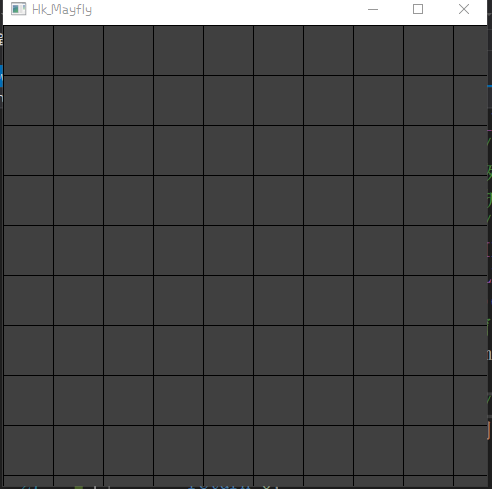
绘制矩形

#include <Windows.h> LRESULT CALLBACK WndProc(HWND, UINT, WPARAM, LPARAM);//消息函数声明 int WINAPI WinMain(HINSTANCE hInstance, HINSTANCE hPrevInstance, PSTR szCmdLine, int iCmdShow)//主函数 { static TCHAR szAppName[] = TEXT("WNDCLASS NAME");//窗口类名称 HWND hwnd;//句柄 MSG msg;//结构体 WNDCLASS wndclass;//窗口类 //窗口类属性 wndclass.style = CS_HREDRAW | CS_VREDRAW;//样式 wndclass.lpfnWndProc = WndProc;//窗口处理函数 wndclass.cbClsExtra = 0;//窗口实例扩展 wndclass.cbWndExtra = 0;//窗口类扩展 wndclass.hInstance = hInstance;//窗口实例句柄 wndclass.hIcon = LoadIcon(NULL, IDI_APPLICATION);//加载图标 wndclass.hCursor = LoadCursor(NULL, IDC_ARROW);//鼠标,移入内容区域变成箭头 wndclass.hbrBackground = (HBRUSH)GetStockObject(WHITENESS);//主窗口背景色 wndclass.lpszMenuName = NULL;//窗口菜单 wndclass.lpszClassName = szAppName;//窗口类名 if (!RegisterClass(&wndclass)) {//注册窗口类,如果注册失败弹出窗口 MessageBox(NULL, TEXT("窗口创建失败!程序需要Windows NT!(传递窗口消息为UNICODE)"), szAppName, MB_ICONERROR);//消息窗口 return 0; } hwnd = CreateWindow(szAppName, //Windows类名 TEXT("Hk_Mayfly"), //窗口标题 WS_OVERLAPPEDWINDOW, //窗口风格 CW_USEDEFAULT, //初始化窗口位置的X坐标 CW_USEDEFAULT, //初始化窗口位置的Y坐标 500, //初始化窗口宽度大小 500, //初始化窗口长度大小 NULL, //父类窗口句柄 NULL, //窗口菜单句柄 hInstance, //程序实例句柄 NULL); //创建参数 ShowWindow(hwnd, iCmdShow);//显示窗口 UpdateWindow(hwnd);//更新窗口 while (GetMessage(&msg, NULL, 0, 0)) {//从消息队列中获取消息 TranslateMessage(&msg);//将虚拟键消息转换为字符消息 DispatchMessage(&msg);//分发到回调函数 } return msg.wParam; } LRESULT CALLBACK WndProc(HWND hwnd, UINT message, WPARAM wParam, LPARAM lParam) { HDC hdc;//设备环境句柄 POINT apt[5] = { 100, 100, 200, 100, 200, 200, 100, 200, 100, 100 };//矩形坐标 int i; /* typedef struct tagRECT { LONG left; LONG top; LONG right; LONG bottom; } RECT 其中left,top赋为0,因此right和bottom表示客户区的宽度和高度(像素) */ RECT rect;//矩形结构 switch (message) {//处理得到的消息 case WM_PAINT://处理窗口绘制 hdc = GetDC(hwnd); GetClientRect(hwnd, &rect);//获取当前位置 MoveToEx(hdc, apt[0].x, apt[0].y, NULL); for (i = 1; i < 5; ++i) { LineTo(hdc, apt[i].x, apt[i].y); } ReleaseDC(hwnd, hdc); return 0; case WM_DESTROY://处理窗口关闭时的消息 PostQuitMessage(0);//将退出消息插入消息队列,程序从消息循环退出,return msg.wParam return 0; } return DefWindowProc(hwnd, message, wParam, lParam);//执行默认消息处理 }

使用Polyline替换,也可以绘制矩形。
Polyline(hdc, apt, 5);
或者
MoveToEx(hdc, apt[0].x, apt[0].y, NULL); PolylineTo(hdc, apt, 5);
绘制正弦曲线

#include <Windows.h> #include <math.h> #define NUM 1000 #define TWOPI (2*3.14159) LRESULT CALLBACK WndProc(HWND, UINT, WPARAM, LPARAM);//消息函数声明 int WINAPI WinMain(HINSTANCE hInstance, HINSTANCE hPrevInstance, PSTR szCmdLine, int iCmdShow)//主函数 { static TCHAR szAppName[] = TEXT("WNDCLASS NAME");//窗口类名称 HWND hwnd;//句柄 MSG msg;//结构体 WNDCLASS wndclass;//窗口类 //窗口类属性 wndclass.style = CS_HREDRAW | CS_VREDRAW;//样式 wndclass.lpfnWndProc = WndProc;//窗口处理函数 wndclass.cbClsExtra = 0;//窗口实例扩展 wndclass.cbWndExtra = 0;//窗口类扩展 wndclass.hInstance = hInstance;//窗口实例句柄 wndclass.hIcon = LoadIcon(NULL, IDI_APPLICATION);//加载图标 wndclass.hCursor = LoadCursor(NULL, IDC_ARROW);//鼠标,移入内容区域变成箭头 wndclass.hbrBackground = (HBRUSH)GetStockObject(WHITENESS);//主窗口背景色 wndclass.lpszMenuName = NULL;//窗口菜单 wndclass.lpszClassName = szAppName;//窗口类名 if (!RegisterClass(&wndclass)) {//注册窗口类,如果注册失败弹出窗口 MessageBox(NULL, TEXT("窗口创建失败!程序需要Windows NT!(传递窗口消息为UNICODE)"), szAppName, MB_ICONERROR);//消息窗口 return 0; } hwnd = CreateWindow(szAppName, //Windows类名 TEXT("Hk_Mayfly"), //窗口标题 WS_OVERLAPPEDWINDOW, //窗口风格 CW_USEDEFAULT, //初始化窗口位置的X坐标 CW_USEDEFAULT, //初始化窗口位置的Y坐标 1000, //初始化窗口宽度大小 500, //初始化窗口高度大小 NULL, //父类窗口句柄 NULL, //窗口菜单句柄 hInstance, //程序实例句柄 NULL); //创建参数 ShowWindow(hwnd, iCmdShow);//显示窗口 UpdateWindow(hwnd);//更新窗口 while (GetMessage(&msg, NULL, 0, 0)) {//从消息队列中获取消息 TranslateMessage(&msg);//将虚拟键消息转换为字符消息 DispatchMessage(&msg);//分发到回调函数 } return msg.wParam; } LRESULT CALLBACK WndProc(HWND hwnd, UINT message, WPARAM wParam, LPARAM lParam) { HDC hdc;//设备环境句柄 PAINTSTRUCT ps; static int cxClient, cyClient; int i; POINT apt[NUM]; switch (message) {//处理得到的消息 case WM_SIZE: cxClient = LOWORD(lParam);//客户区宽度 cyClient = HIWORD(lParam);//客户区的高度 return 0; case WM_PAINT://处理窗口绘制 hdc = BeginPaint(hwnd, &ps); MoveToEx(hdc, 0, cyClient / 2, NULL);//中间横线 LineTo(hdc, cxClient, cyClient / 2); for (i = 0; i < NUM; i++) { apt[i].x = i * cxClient / NUM; apt[i].y = (int)(cyClient / 2 * (1 - sin(TWOPI * i / NUM))); //apt[i].x = i*15; //apt[i].y = (int)cyClient*sin(0.1*i); } Polyline(hdc, apt, NUM); EndPaint(hwnd, &ps); return 0; case WM_DESTROY://处理窗口关闭时的消息 PostQuitMessage(0);//将退出消息插入消息队列,程序从消息循环退出,return msg.wParam return 0; } return DefWindowProc(hwnd, message, wParam, lParam);//执行默认消息处理 }
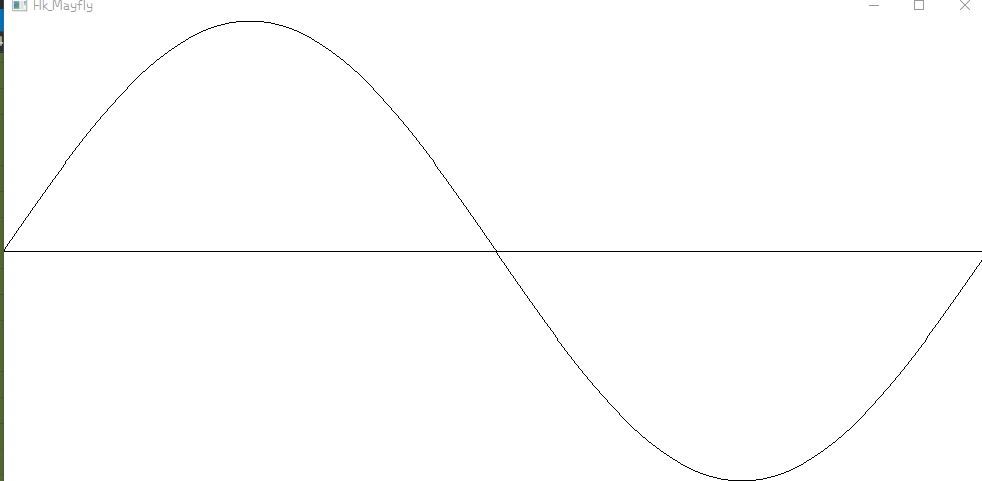
5.3.3 边框绘制函数

#include <Windows.h> LRESULT CALLBACK WndProc(HWND, UINT, WPARAM, LPARAM); int WINAPI WinMain(HINSTANCE hInstance, HINSTANCE hPrevInstance, PSTR szCmdLine, int iCmdShow) { static TCHAR szAppName[] = TEXT("WNDCLASS NAME"); HWND hwnd; MSG msg; WNDCLASS wndclass; wndclass.style = CS_HREDRAW | CS_VREDRAW; wndclass.lpfnWndProc = WndProc; wndclass.cbClsExtra = 0; wndclass.cbWndExtra = 0; wndclass.hInstance = hInstance; wndclass.hIcon = LoadIcon(NULL, IDI_APPLICATION); wndclass.hCursor = LoadCursor(NULL, IDC_ARROW); wndclass.hbrBackground = (HBRUSH)GetStockObject(WHITE_BRUSH); wndclass.lpszMenuName = NULL; wndclass.lpszClassName = szAppName; if (!RegisterClass(&wndclass)) { MessageBox(NULL, TEXT("窗口创建失败!需要Windows NT!(传递消息为UNICODE)"), szAppName, MB_ICONERROR); return 0; } hwnd = CreateWindow( szAppName, TEXT("Hk_Mayfly"), WS_OVERLAPPEDWINDOW, CW_USEDEFAULT, CW_USEDEFAULT, 1000,//宽度 500,//高度 NULL, NULL, hInstance, NULL ); ShowWindow(hwnd, iCmdShow); UpdateWindow(hwnd); while (GetMessage(&msg, NULL, 0, 0)) { TranslateMessage(&msg); DispatchMessage(&msg); } return msg.wParam; } LRESULT CALLBACK WndProc(HWND hwnd, UINT message, WPARAM wParam, LPARAM lParam) { HDC hdc; PAINTSTRUCT ps; switch (message) { case WM_PAINT: hdc = BeginPaint(hwnd, &ps); //Rectangle(hdc, 100, 200, 500, 400);//矩形 //Ellipse(hdc, 100, 200, 500, 400);//椭圆 //RoundRect(hdc, 100, 200, 500, 400, 100, 100);//圆角矩阵 //Arc(hdc, 100, 200, 500, 400, 500, 350, 100, 350);//弧 //Chord(hdc, 100, 200, 500, 400, 500, 350, 100, 350);//弦 //Pie(hdc, 100, 200, 500, 400, 500, 350, 100, 350);//饼 EndPaint(hwnd, &ps); return 0; case WM_DESTROY: PostQuitMessage(0); return 0; } return DefWindowProc(hwnd, message, wParam, lParam); }
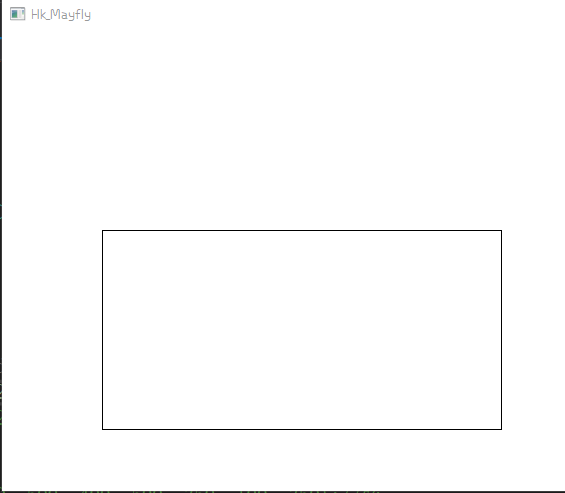
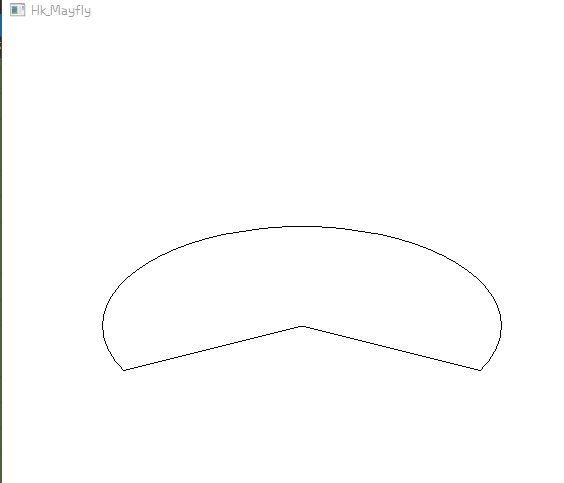
自定义程序
#include <Windows.h> LRESULT CALLBACK WndProc(HWND, UINT, WPARAM, LPARAM); int WINAPI WinMain(HINSTANCE hInstance, HINSTANCE hPrevInstance, PSTR szCmdLine, int iCmdShow) { static TCHAR szAppName[] = TEXT("WNDCLASS NAME"); HWND hwnd; MSG msg; WNDCLASS wndclass; wndclass.style = CS_HREDRAW | CS_VREDRAW; wndclass.lpfnWndProc = WndProc; wndclass.cbClsExtra = 0; wndclass.cbWndExtra = 0; wndclass.hInstance = hInstance; wndclass.hIcon = LoadIcon(NULL, IDI_APPLICATION); wndclass.hCursor = LoadCursor(NULL, IDC_ARROW); wndclass.hbrBackground = (HBRUSH)GetStockObject(WHITE_BRUSH); wndclass.lpszMenuName = NULL; wndclass.lpszClassName = szAppName; if (!RegisterClass(&wndclass)) { MessageBox(NULL, TEXT("窗口创建失败!需要Windows NT!(传递消息为UNICODE)"), szAppName, MB_ICONERROR); return 0; } hwnd = CreateWindow( szAppName, TEXT("Hk_Mayfly"), WS_OVERLAPPEDWINDOW, CW_USEDEFAULT, CW_USEDEFAULT, 800,//宽度 800,//高度 NULL, NULL, hInstance, NULL ); ShowWindow(hwnd, iCmdShow); UpdateWindow(hwnd); while (GetMessage(&msg, NULL, 0, 0)) { TranslateMessage(&msg); DispatchMessage(&msg); } return msg.wParam; } LRESULT CALLBACK WndProc(HWND hwnd, UINT message, WPARAM wParam, LPARAM lParam) { static int cxClient, cyClient; HDC hdc; PAINTSTRUCT ps; switch (message) { case WM_SIZE: cxClient = LOWORD(lParam); cyClient = HIWORD(lParam); return 0; case WM_PAINT: hdc = BeginPaint(hwnd, &ps); Rectangle(hdc, 200, 200, 600, 600); MoveToEx(hdc, 0, 0, NULL); LineTo(hdc, 200, 200); MoveToEx(hdc, cxClient, 0, NULL); LineTo(hdc, 600, 200); MoveToEx(hdc, 0, cyClient, NULL); LineTo(hdc, 200, 600); MoveToEx(hdc, cxClient, cyClient, NULL); LineTo(hdc, 600, 600); Ellipse(hdc, 200, 200, 600, 600); Arc(hdc, 300, 200, 500, 400, 400, 200, 400, 400);//弧,逆时针绘制 Arc(hdc, 300, 400, 500, 600, 400, 600, 400, 400); Ellipse(hdc, 388, 288, 412, 312);//小圆圈 Ellipse(hdc, 388, 488, 412, 512); EndPaint(hwnd, &ps); return 0; case WM_DESTROY: PostQuitMessage(0); return 0; } return DefWindowProc(hwnd, message, wParam, lParam); }

5.3.4 贝塞尔样条曲线
一条二维的贝塞尔曲线由四个点定义-两个端点和两个控制点。曲线的端点在两个端点上,控制点就好像「磁石」一样把曲线从两个端点间的直线处拉走。

#include <Windows.h> LRESULT CALLBACK WndProc(HWND, UINT, WPARAM, LPARAM); int WINAPI WinMain(HINSTANCE hInstance, HINSTANCE hPrevInstance, PSTR szCmdLine, int iCmdShow) { static TCHAR szAppName[] = TEXT("WNDCLASS NAME"); HWND hwnd; MSG msg; WNDCLASS wndclass; wndclass.style = CS_HREDRAW | CS_VREDRAW; wndclass.lpfnWndProc = WndProc; wndclass.cbClsExtra = 0; wndclass.cbWndExtra = 0; wndclass.hInstance = hInstance; wndclass.hIcon = LoadIcon(NULL, IDI_APPLICATION); wndclass.hCursor = LoadCursor(NULL, IDC_ARROW); wndclass.hbrBackground = (HBRUSH)GetStockObject(WHITE_BRUSH); wndclass.lpszMenuName = NULL; wndclass.lpszClassName = szAppName; if (!RegisterClass(&wndclass)) { MessageBox(NULL, TEXT("窗口创建失败!需要Windows NT!(传递消息为UNICODE)"), szAppName, MB_ICONERROR); return 0; } hwnd = CreateWindow( szAppName, TEXT("Hk_Mayfly"), WS_OVERLAPPEDWINDOW, CW_USEDEFAULT, CW_USEDEFAULT, CW_USEDEFAULT,//宽度 CW_USEDEFAULT,//高度 NULL, NULL, hInstance, NULL ); ShowWindow(hwnd, iCmdShow); UpdateWindow(hwnd); while (GetMessage(&msg, NULL, 0, 0)) { TranslateMessage(&msg); DispatchMessage(&msg); } return msg.wParam; } void DrawBezier(HDC hdc, POINT apt[]) { PolyBezier(hdc, apt, 4); MoveToEx(hdc, apt[0].x, apt[0].y, NULL); LineTo(hdc, apt[1].x, apt[1].y); MoveToEx(hdc, apt[2].x, apt[2].y, NULL); LineTo(hdc, apt[3].x, apt[3].y); } LRESULT CALLBACK WndProc(HWND hwnd, UINT message, WPARAM wParam, LPARAM lParam) { static POINT apt[4]; int cxClient, cyClient; HDC hdc; PAINTSTRUCT ps; switch (message) { case WM_SIZE: cxClient = LOWORD(lParam); cyClient = HIWORD(lParam); apt[0].x = cxClient / 4; apt[0].y = cyClient / 2; apt[1].x = cxClient / 2; apt[1].y = cyClient / 4; apt[2].x = cxClient / 2; apt[2].y = 3 * cyClient / 4; apt[3].x = 3 * cxClient / 4; apt[3].y = cyClient / 2; return 0; case WM_LBUTTONDOWN: case WM_RBUTTONDOWN: case WM_MOUSEMOVE: if (wParam & MK_LBUTTON || wParam & MK_RBUTTON) { hdc = GetDC(hwnd); SelectObject(hdc, GetStockObject(WHITE_PEN)); DrawBezier(hdc, apt); if (wParam & MK_LBUTTON) { apt[1].x = LOWORD(lParam); apt[1].y = HIWORD(lParam); } if (wParam & MK_RBUTTON) { apt[2].x = LOWORD(lParam); apt[2].y = HIWORD(lParam); } SelectObject(hdc, GetStockObject(BLACK_PEN)); DrawBezier(hdc, apt); ReleaseDC(hwnd, hdc); } return 0; case WM_PAINT: InvalidateRect(hwnd, NULL, TRUE); hdc = BeginPaint(hwnd, &ps); DrawBezier(hdc, apt); EndPaint(hwnd, &ps); return 0; case WM_DESTROY: PostQuitMessage(0); return 0; } return DefWindowProc(hwnd, message, wParam, lParam); }
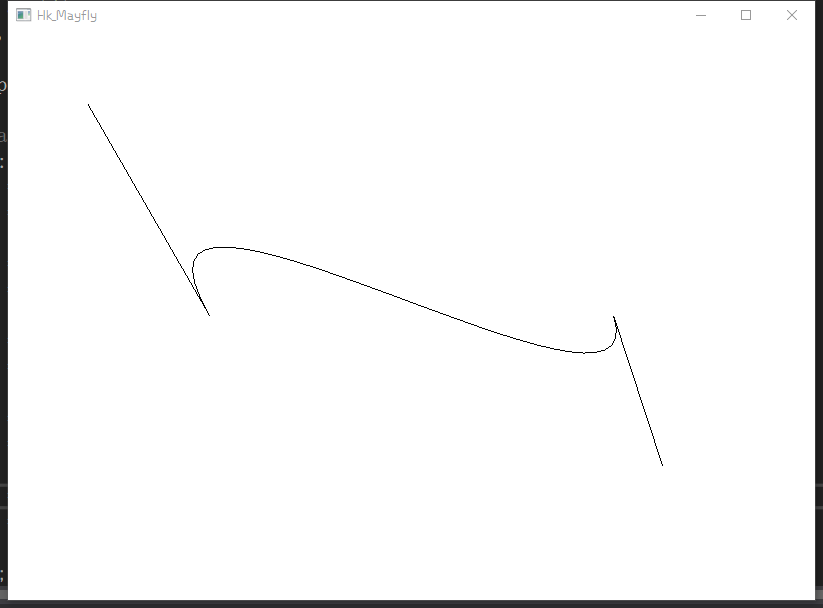
5.3.6 创建,选择和删除画笔
#include <Windows.h> LRESULT CALLBACK WndProc(HWND, UINT, WPARAM, LPARAM); int WINAPI WinMain(HINSTANCE hInstance, HINSTANCE hPrevInstance, PSTR szCmdLine, int iCmdShow) { static TCHAR szAppName[] = TEXT("WNDCLASS NAME"); HWND hwnd; MSG msg; WNDCLASS wndclass; wndclass.style = CS_HREDRAW | CS_VREDRAW; wndclass.lpfnWndProc = WndProc; wndclass.cbClsExtra = 0; wndclass.cbWndExtra = 0; wndclass.hInstance = hInstance; wndclass.hIcon = LoadIcon(NULL, IDI_APPLICATION); wndclass.hCursor = LoadCursor(NULL, IDC_ARROW); wndclass.hbrBackground = (HBRUSH)GetStockObject(WHITE_BRUSH); wndclass.lpszMenuName = NULL; wndclass.lpszClassName = szAppName; if (!RegisterClass(&wndclass)) { MessageBox(NULL, TEXT("窗口创建失败!需要Windows NT!(传递消息为UNICODE)"), szAppName, MB_ICONERROR); return 0; } hwnd = CreateWindow( szAppName, TEXT("Hk_Mayfly"), WS_OVERLAPPEDWINDOW, CW_USEDEFAULT, CW_USEDEFAULT, 800,//宽度 800,//高度 NULL, NULL, hInstance, NULL ); ShowWindow(hwnd, iCmdShow); UpdateWindow(hwnd); while (GetMessage(&msg, NULL, 0, 0)) { TranslateMessage(&msg); DispatchMessage(&msg); } return msg.wParam; } LRESULT CALLBACK WndProc(HWND hwnd, UINT message, WPARAM wParam, LPARAM lParam) { static int cxClient, cyClient; HDC hdc; PAINTSTRUCT ps; static HPEN hPen1, hPen2; switch (message) { case WM_CREATE: hPen1 = CreatePen(PS_DOT, 0, 0); hPen2 = CreatePen(PS_DASH, 1, RGB(255, 0, 0)); case WM_SIZE: cxClient = LOWORD(lParam); cyClient = HIWORD(lParam); return 0; case WM_PAINT: hdc = BeginPaint(hwnd, &ps); SelectObject(hdc, hPen1); Ellipse(hdc, 200, 200, 600, 600); Ellipse(hdc, 388, 288, 412, 312);//小圆圈 SelectObject(hdc, hPen2); Arc(hdc, 300, 200, 500, 400, 400, 200, 400, 400);//弧,逆时针绘制 SelectObject(hdc, CreatePen(PS_DASH, 1, RGB(50, 50, 50))); Arc(hdc, 300, 400, 500, 600, 400, 600, 400, 400); Ellipse(hdc, 388, 488, 412, 512); DeleteObject(SelectObject(hdc, CreatePen(PS_DASH, 1, RGB(50, 50, 50)))); EndPaint(hwnd, &ps); return 0; case WM_DESTROY: DeleteObject(hPen1); DeleteObject(hPen2); PostQuitMessage(0); return 0; } return DefWindowProc(hwnd, message, wParam, lParam); }
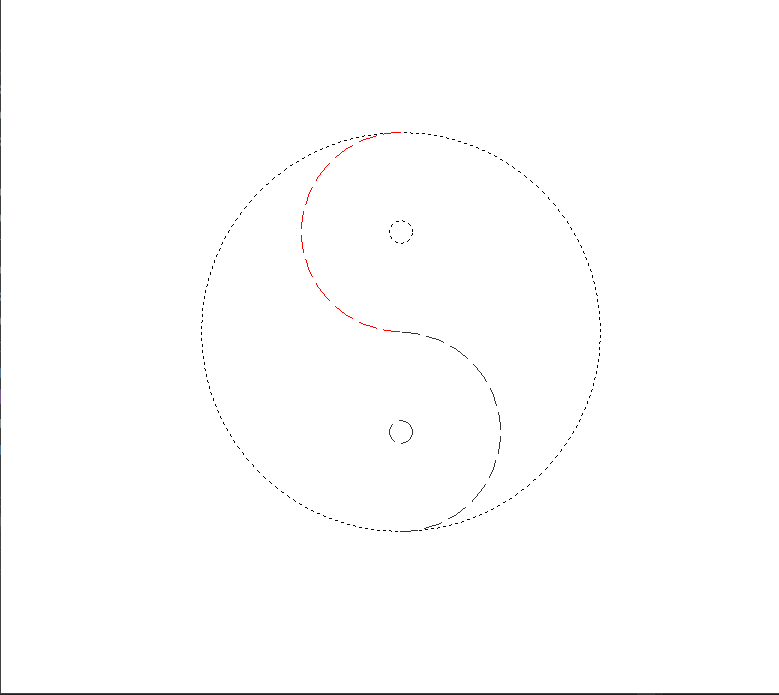
5.4 绘制填充区域

#include <Windows.h> LRESULT CALLBACK WndProc(HWND, UINT, WPARAM, LPARAM); int WINAPI WinMain(HINSTANCE hInstance, HINSTANCE hPrevInstance, PSTR szCmdLine, int iCmdShow) { static TCHAR szAppName[] = TEXT("WNDCLASS NAME"); HWND hwnd; MSG msg; WNDCLASS wndclass; wndclass.style = CS_HREDRAW | CS_VREDRAW; wndclass.lpfnWndProc = WndProc; wndclass.cbClsExtra = 0; wndclass.cbWndExtra = 0; wndclass.hInstance = hInstance; wndclass.hIcon = LoadIcon(NULL, IDI_APPLICATION); wndclass.hCursor = LoadCursor(NULL, IDC_ARROW); wndclass.hbrBackground = (HBRUSH)GetStockObject(WHITE_BRUSH); wndclass.lpszMenuName = NULL; wndclass.lpszClassName = szAppName; if (!RegisterClass(&wndclass)) { MessageBox(NULL, TEXT("窗口创建失败!需要Windows NT!(传递消息为UNICODE)"), szAppName, MB_ICONERROR); return 0; } hwnd = CreateWindow( szAppName, TEXT("Hk_Mayfly"), WS_OVERLAPPEDWINDOW, CW_USEDEFAULT, CW_USEDEFAULT, 800,//宽度 800,//高度 NULL, NULL, hInstance, NULL ); ShowWindow(hwnd, iCmdShow); UpdateWindow(hwnd); while (GetMessage(&msg, NULL, 0, 0)) { TranslateMessage(&msg); DispatchMessage(&msg); } return msg.wParam; } LRESULT CALLBACK WndProc(HWND hwnd, UINT message, WPARAM wParam, LPARAM lParam) { static int cxClient, cyClient; HDC hdc; PAINTSTRUCT ps; static HBRUSH hBrush; switch (message) { case WM_CREATE: hBrush = GetStockObject(LTGRAY_BRUSH);//获取句柄 case WM_SIZE: cxClient = LOWORD(lParam); cyClient = HIWORD(lParam); return 0; case WM_PAINT: hdc = BeginPaint(hwnd, &ps); SelectObject(hdc, hBrush);//选入设备环境 Ellipse(hdc, 200, 200, 600, 600); Ellipse(hdc, 388, 288, 412, 312);//小圆圈 Arc(hdc, 300, 200, 500, 400, 400, 200, 400, 400);//弧,逆时针绘制 Arc(hdc, 300, 400, 500, 600, 400, 600, 400, 400); Ellipse(hdc, 388, 488, 412, 512); DeleteObject(SelectObject(hdc, CreatePen(PS_DASH, 1, RGB(50, 50, 50)))); EndPaint(hwnd, &ps); return 0; case WM_DESTROY: PostQuitMessage(0); return 0; } return DefWindowProc(hwnd, message, wParam, lParam); }
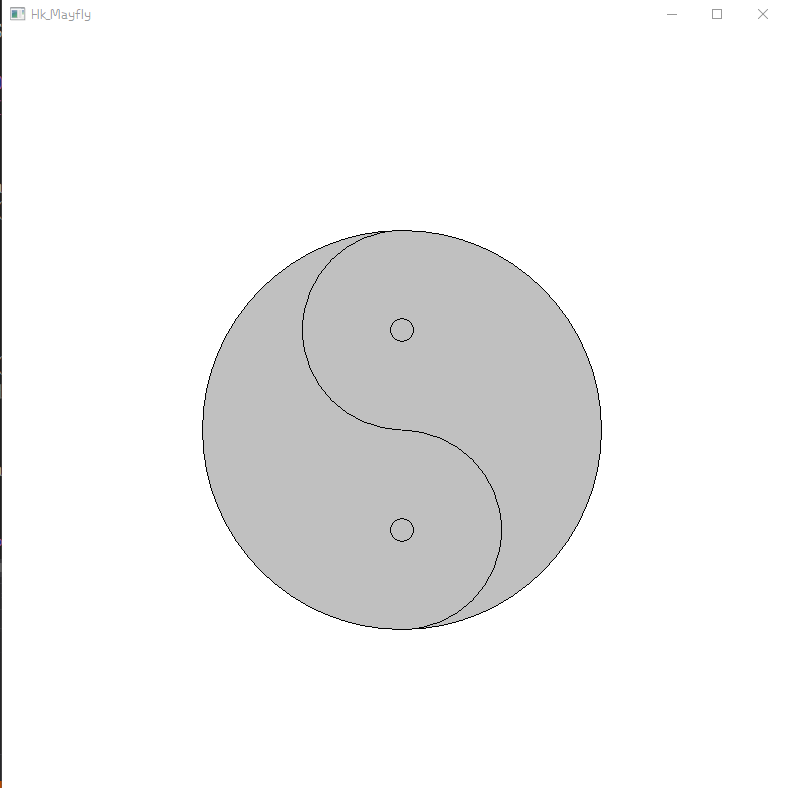
5.4.1 Polygon函数和多边形填充模式
Polygon按照点的顺序连接多边图形,如果数组中最后一个点与第一个点不同,则Windows会再添加一条线连接最后一个点与第一个点。
#include <Windows.h> LRESULT CALLBACK WndProc(HWND, UINT, WPARAM, LPARAM); int WINAPI WinMain(HINSTANCE hInstance, HINSTANCE hPrevInstance, PSTR szCmdLine, int iCmdShow) { static TCHAR szAppName[] = TEXT("WNDCLASS NAME"); HWND hwnd; MSG msg; WNDCLASS wndclass; wndclass.style = CS_HREDRAW | CS_VREDRAW; wndclass.lpfnWndProc = WndProc; wndclass.cbClsExtra = 0; wndclass.cbWndExtra = 0; wndclass.hInstance = hInstance; wndclass.hIcon = LoadIcon(NULL, IDI_APPLICATION); wndclass.hCursor = LoadCursor(NULL, IDC_ARROW); wndclass.hbrBackground = (HBRUSH)GetStockObject(WHITE_BRUSH); wndclass.lpszMenuName = NULL; wndclass.lpszClassName = szAppName; if (!RegisterClass(&wndclass)) { MessageBox(NULL, TEXT("窗口创建失败!需要Windows NT!(传递消息为UNICODE)"), szAppName, MB_ICONERROR); return 0; } hwnd = CreateWindow( szAppName, TEXT("Hk_Mayfly"), WS_OVERLAPPEDWINDOW, CW_USEDEFAULT, CW_USEDEFAULT, CW_USEDEFAULT,//宽度 CW_USEDEFAULT,//高度 NULL, NULL, hInstance, NULL ); ShowWindow(hwnd, iCmdShow); UpdateWindow(hwnd); while (GetMessage(&msg, NULL, 0, 0)) { TranslateMessage(&msg); DispatchMessage(&msg); } return msg.wParam; } LRESULT CALLBACK WndProc(HWND hwnd, UINT message, WPARAM wParam, LPARAM lParam) { static POINT apt[6] = { 100, 200, 100, 100, 200, 50, 300, 100, 300, 200, 200, 250}; static int cxClient, cyClient; HDC hdc; PAINTSTRUCT ps; switch (message) { case WM_PAINT: hdc = BeginPaint(hwnd, &ps); SelectObject(hdc, GetStockObject(GRAY_BRUSH));//获取灰色画刷并设置到环境设备中 Polygon(hdc, apt, 6); EndPaint(hwnd, &ps); return 0; case WM_DESTROY: PostQuitMessage(0); return 0; } return DefWindowProc(hwnd, message, wParam, lParam); }
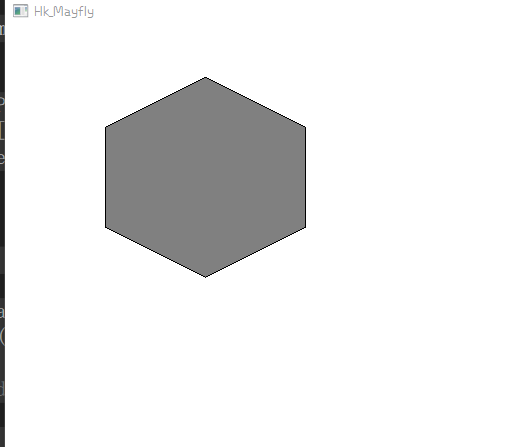
PolyPolygon(hdc, apt, aiCounts, iPolyCount);
#include <Windows.h> LRESULT CALLBACK WndProc(HWND, UINT, WPARAM, LPARAM); int WINAPI WinMain(HINSTANCE hInstance, HINSTANCE hPrevInstance, PSTR szCmdLine, int iCmdShow) { static TCHAR szAppName[] = TEXT("WNDCLASS NAME"); HWND hwnd; MSG msg; WNDCLASS wndclass; wndclass.style = CS_HREDRAW | CS_VREDRAW; wndclass.lpfnWndProc = WndProc; wndclass.cbClsExtra = 0; wndclass.cbWndExtra = 0; wndclass.hInstance = hInstance; wndclass.hIcon = LoadIcon(NULL, IDI_APPLICATION); wndclass.hCursor = LoadCursor(NULL, IDC_ARROW); wndclass.hbrBackground = (HBRUSH)GetStockObject(WHITE_BRUSH); wndclass.lpszMenuName = NULL; wndclass.lpszClassName = szAppName; if (!RegisterClass(&wndclass)) { MessageBox(NULL, TEXT("窗口创建失败!需要Windows NT!(传递消息为UNICODE)"), szAppName, MB_ICONERROR); return 0; } hwnd = CreateWindow( szAppName, TEXT("Hk_Mayfly"), WS_OVERLAPPEDWINDOW, CW_USEDEFAULT, CW_USEDEFAULT, CW_USEDEFAULT,//宽度 CW_USEDEFAULT,//高度 NULL, NULL, hInstance, NULL ); ShowWindow(hwnd, iCmdShow); UpdateWindow(hwnd); while (GetMessage(&msg, NULL, 0, 0)) { TranslateMessage(&msg); DispatchMessage(&msg); } return msg.wParam; } LRESULT CALLBACK WndProc(HWND hwnd, UINT message, WPARAM wParam, LPARAM lParam) { static POINT apt[10] = { 100, 200, 100, 100, 200, 50, 300, 100, 300, 200, 200, 250, 400, 200, 400, 100, 500, 50, 600, 100 };//六边形(前6组坐标)和四边形 static int aiCounts[2] = { 6, 4 };//6个顶点,4个顶点 static int cxClient, cyClient; HDC hdc; PAINTSTRUCT ps; switch (message) { case WM_PAINT: hdc = BeginPaint(hwnd, &ps); SelectObject(hdc, GetStockObject(GRAY_BRUSH));//获取灰色画刷并设置到环境设备中 PolyPolygon(hdc, apt, aiCounts, 2); EndPaint(hwnd, &ps); return 0; case WM_DESTROY: PostQuitMessage(0); return 0; } return DefWindowProc(hwnd, message, wParam, lParam); }
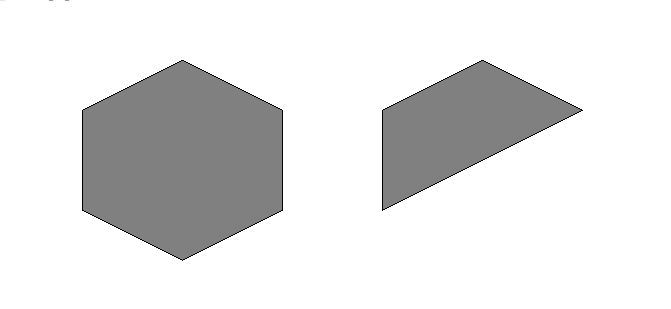
#include <Windows.h> LRESULT CALLBACK WndProc(HWND, UINT, WPARAM, LPARAM); int WINAPI WinMain(HINSTANCE hInstance, HINSTANCE hPrevInstance, PSTR szCmdLine, int iCmdShow) { static TCHAR szAppName[] = TEXT("WNDCLASS NAME"); HWND hwnd; MSG msg; WNDCLASS wndclass; wndclass.style = CS_HREDRAW | CS_VREDRAW; wndclass.lpfnWndProc = WndProc; wndclass.cbClsExtra = 0; wndclass.cbWndExtra = 0; wndclass.hInstance = hInstance; wndclass.hIcon = LoadIcon(NULL, IDI_APPLICATION); wndclass.hCursor = LoadCursor(NULL, IDC_ARROW); wndclass.hbrBackground = (HBRUSH)GetStockObject(WHITE_BRUSH); wndclass.lpszMenuName = NULL; wndclass.lpszClassName = szAppName; if (!RegisterClass(&wndclass)) { MessageBox(NULL, TEXT("窗口创建失败!需要Windows NT!(传递消息为UNICODE)"), szAppName, MB_ICONERROR); return 0; } hwnd = CreateWindow( szAppName, TEXT("Hk_Mayfly"), WS_OVERLAPPEDWINDOW, CW_USEDEFAULT, CW_USEDEFAULT, CW_USEDEFAULT,//宽度 CW_USEDEFAULT,//高度 NULL, NULL, hInstance, NULL ); ShowWindow(hwnd, iCmdShow); UpdateWindow(hwnd); while (GetMessage(&msg, NULL, 0, 0)) { TranslateMessage(&msg); DispatchMessage(&msg); } return msg.wParam; } LRESULT CALLBACK WndProc(HWND hwnd, UINT message, WPARAM wParam, LPARAM lParam) { static POINT aptFigure[10] = { 10, 70, 50, 70, 50, 10, 90, 10, 90, 50, 30, 50, 30, 90, 70, 90, 70, 30, 10, 30 }; static int cxClient, cyClient; HDC hdc; PAINTSTRUCT ps; int i; static POINT apt[10]; switch (message) { case WM_SIZE: cxClient = LOWORD(lParam); cyClient = HIWORD(lParam); return 0; case WM_PAINT: hdc = BeginPaint(hwnd, &ps); SelectObject(hdc, GetStockObject(GRAY_BRUSH));//获取灰色画刷并设置到环境设备中 for (i = 0; i < 10; ++i) { apt[i].x = cxClient * aptFigure[i].x / 200; apt[i].y = cyClient * aptFigure[i].y / 100; } SetPolyFillMode(hdc, ALTERNATE);//设置填充模式为交替模式 Polygon(hdc, apt, 10); for (i = 0; i < 10; ++i) { apt[i].x += cxClient / 2; } SetPolyFillMode(hdc, WINDING);//设置填充模式为螺旋模式 Polygon(hdc, apt, 10); EndPaint(hwnd, &ps); return 0; case WM_DESTROY: PostQuitMessage(0); return 0; } return DefWindowProc(hwnd, message, wParam, lParam); }
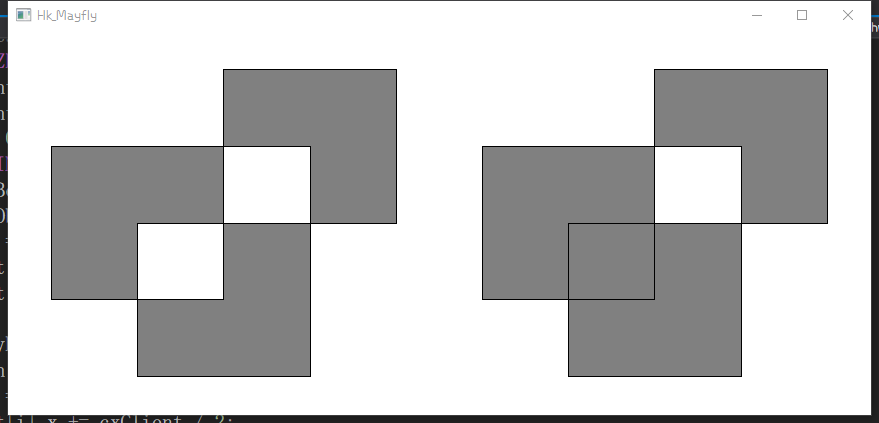
5.4.2 用画刷填充内部
#include <Windows.h> LRESULT CALLBACK WndProc(HWND, UINT, WPARAM, LPARAM); int WINAPI WinMain(HINSTANCE hInstance, HINSTANCE hPrevInstance, PSTR szCmdLine, int iCmdShow) { static TCHAR szAppName[] = TEXT("WNDCLASS NAME"); HWND hwnd; MSG msg; WNDCLASS wndclass; wndclass.style = CS_HREDRAW | CS_VREDRAW; wndclass.lpfnWndProc = WndProc; wndclass.cbClsExtra = 0; wndclass.cbWndExtra = 0; wndclass.hInstance = hInstance; wndclass.hIcon = LoadIcon(NULL, IDI_APPLICATION); wndclass.hCursor = LoadCursor(NULL, IDC_ARROW); wndclass.hbrBackground = (HBRUSH)GetStockObject(WHITE_BRUSH); wndclass.lpszMenuName = NULL; wndclass.lpszClassName = szAppName; if (!RegisterClass(&wndclass)) { MessageBox(NULL, TEXT("窗口创建失败!需要Windows NT!(传递消息为UNICODE)"), szAppName, MB_ICONERROR); return 0; } hwnd = CreateWindow( szAppName, TEXT("Hk_Mayfly"), WS_OVERLAPPEDWINDOW, CW_USEDEFAULT, CW_USEDEFAULT, CW_USEDEFAULT,//宽度 CW_USEDEFAULT,//高度 NULL, NULL, hInstance, NULL ); ShowWindow(hwnd, iCmdShow); UpdateWindow(hwnd); while (GetMessage(&msg, NULL, 0, 0)) { TranslateMessage(&msg); DispatchMessage(&msg); } return msg.wParam; } LRESULT CALLBACK WndProc(HWND hwnd, UINT message, WPARAM wParam, LPARAM lParam) { static POINT apt[6] = { 100, 200, 100, 100, 200, 50, 300, 100, 300, 200, 200, 250}; HDC hdc; PAINTSTRUCT ps; HBRUSH hBrush; static int i; switch (message) { case WM_PAINT: hdc = BeginPaint(hwnd, &ps); //SetBkMode(hdc, TRANSPARENT); hBrush = CreateSolidBrush(BLACK_BRUSH);//创建一个纯色画刷,但是这个画刷不一定为纯色 //SelectObject(hdc, GetStockObject(GRAY_BRUSH));//获取灰色画刷并设置到环境设备中 SelectObject(hdc, hBrush);//将画刷选入设备环境 Polygon(hdc, apt, 6); for (i = 0; i < 6; ++i) { apt[i].x += 300; } hBrush = CreateHatchBrush(HS_FDIAGONAL, GRAY_BRUSH);//第一个参数是阴影线标记的外观 SelectObject(hdc, hBrush); Polygon(hdc, apt, 6); EndPaint(hwnd, &ps); return 0; case WM_DESTROY: PostQuitMessage(0); return 0; } return DefWindowProc(hwnd, message, wParam, lParam); }
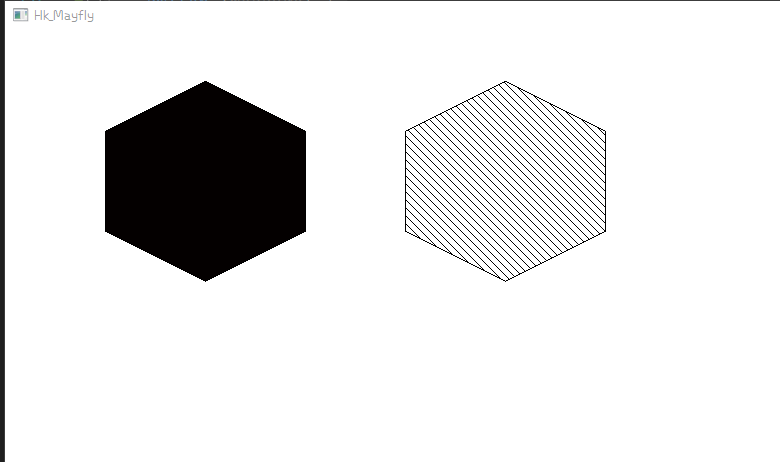
5.5 GDI映射模式
Windows定义了8种映像方式,它们在WINGDI.H中相应的标识符和含义如表
| 映像方式 | 逻辑单位 | 增加值 | |
| x值 | y值 | ||
| MM_TEXT | 图素 | 右 | 下 |
| MM_LOMETRIC | 0.1 mm | 右 | 上 |
| MM_HIMETRIC | 0.01 mm | 右 | 上 |
| MM_LOENGLISH | 0.01 in. | 右 | 上 |
| MM_HIENGLISH | 0.001 in. | 右 | 上 |
| MM_TWIPS | 1/1440 in. | 右 | 上 |
| MM_ISOTROPIC | 任意(x = y) | 可选 | 可选 |
| MM_ANISOTROPIC | 任意(x != y) | 可选 | 可选 |
#include <Windows.h> LRESULT CALLBACK WndProc(HWND, UINT, WPARAM, LPARAM); int WINAPI WinMain(HINSTANCE hInstance, HINSTANCE hPrevInstance, PSTR szCmdLine, int iCmdShow) { static TCHAR szAppName[] = TEXT("WNDCLASS NAME"); HWND hwnd; MSG msg; WNDCLASS wndclass; wndclass.style = CS_HREDRAW | CS_VREDRAW; wndclass.lpfnWndProc = WndProc; wndclass.cbClsExtra = 0; wndclass.cbWndExtra = 0; wndclass.hInstance = hInstance; wndclass.hIcon = LoadIcon(NULL, IDI_APPLICATION); wndclass.hCursor = LoadCursor(NULL, IDC_ARROW); wndclass.hbrBackground = (HBRUSH)GetStockObject(WHITE_BRUSH); wndclass.lpszMenuName = NULL; wndclass.lpszClassName = szAppName; if (!RegisterClass(&wndclass)) { MessageBox(NULL, TEXT("窗口创建失败!需要Windows NT!(传递消息为UNICODE)"), szAppName, MB_ICONERROR); return 0; } hwnd = CreateWindow( szAppName, TEXT("Hk_Mayfly"), WS_OVERLAPPEDWINDOW, CW_USEDEFAULT, CW_USEDEFAULT, CW_USEDEFAULT,//宽度 CW_USEDEFAULT,//高度 NULL, NULL, hInstance, NULL ); ShowWindow(hwnd, iCmdShow); UpdateWindow(hwnd); while (GetMessage(&msg, NULL, 0, 0)) { TranslateMessage(&msg); DispatchMessage(&msg); } return msg.wParam; } LRESULT CALLBACK WndProc(HWND hwnd, UINT message, WPARAM wParam, LPARAM lParam) { HDC hdc; PAINTSTRUCT ps; static int iMapMode; TCHAR szBuffer[] = L"Hk_Mayfly!!!!?"; switch (message) { case WM_PAINT: hdc = BeginPaint(hwnd, &ps); iMapMode = GetMapMode(hdc);//获取当前的映射模式 TextOut(hdc, 1, 400, szBuffer, lstrlen(szBuffer));//逻辑单位1像素, 一像素0.3mm int iLength = wsprintf(szBuffer, TEXT("Biu biu!!!")); iMapMode = MM_TWIPS; SetMapMode(hdc, iMapMode);//逻辑单位1/1440in, 一英寸2.54cm TextOut(hdc, 1, -400, szBuffer, iLength); iMapMode = MM_LOMETRIC; SetMapMode(hdc, iMapMode);//逻辑单位0.1mm TextOut(hdc, 1, -400, szBuffer, wsprintf(szBuffer, TEXT("%s"), L"Test!!!")); EndPaint(hwnd, &ps); return 0; case WM_DESTROY: PostQuitMessage(0); return 0; } return DefWindowProc(hwnd, message, wParam, lParam); }
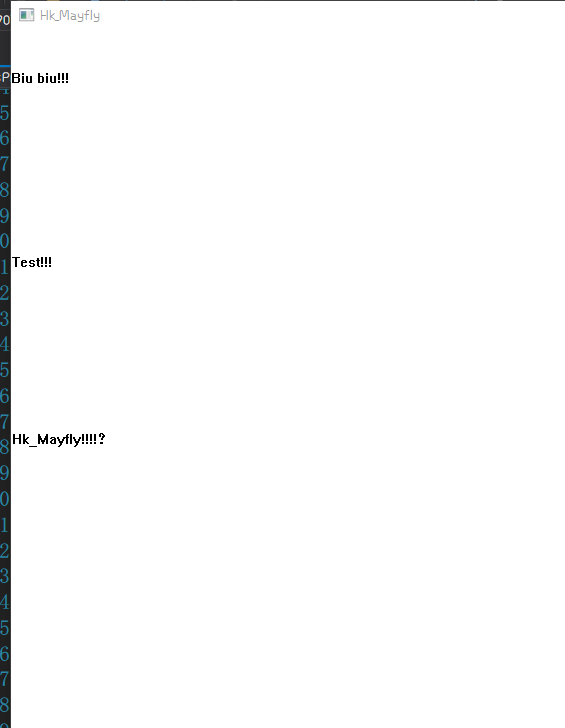
5.5.1 设备坐标和逻辑坐标
在呼叫GetTextMetrics以取得关于字符的宽度和高度信息时,映像方式必须设定成根据这些信息输出文字时所使用的映像方式
5.5.2 设备坐标系统
「屏幕坐标」:当我们使用整个屏幕时,就根据「屏幕坐标」进行操作。屏幕的左上角为(0,0)点,屏幕坐标用在WM_MOVE消息(对于非子窗口)以及下列Windows函数中:CreateWindow和MoveWindow(都是对于非子窗口)、GetMessagePos、GetCursorPos、SetCursorPos、GetWindowRect以及WindowFromPoint(这不是全部函数的列表)。它们或者是与窗口无关的函数(如两个光标函数),或者是必须相对于某个屏幕点来移动(或者寻找)窗口的函数。如果以DISPLAY为参数呼叫CreateDC,以取得整个屏幕的设备内容,则内定情况下GDI呼叫中指定的逻辑坐标将被映像为屏幕坐标。
「全窗口坐标」:以程序的整个窗口为基准,如标题列、菜单、滚动条和窗口框都包括在内。而对于普通窗口,点(0,0)是缩放边框的左上角。全窗口坐标在Windows中极少使用,但是如果用GetWindowDC取得设备内容,GDI函数中的逻辑坐标就会转换为显示区域坐标。
「显示区域坐标系」:点(0,0)是显示区域的左上角。当使用GetDC或BeginPaint取得设备内容时,GDI函数中的逻辑坐标就会内定转换为显示区域坐标。
用函数ClientToScreen和ScreenToClient可以将显示区域坐标转换为屏幕坐标,或者反过来,将屏幕坐标转换为显示区域坐标。也可以使用GetWindowRect函数取得屏幕坐标下的整个窗口的位置和大小。这三个函数为一种设备坐标转换为另一种提供了足够的信息。




